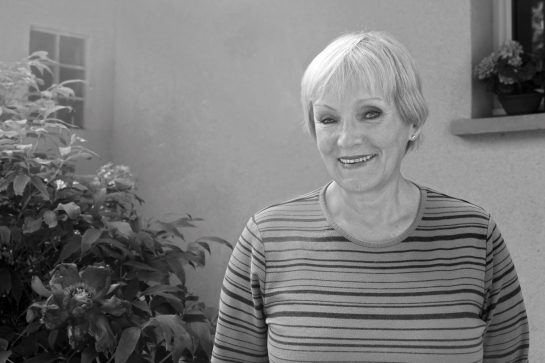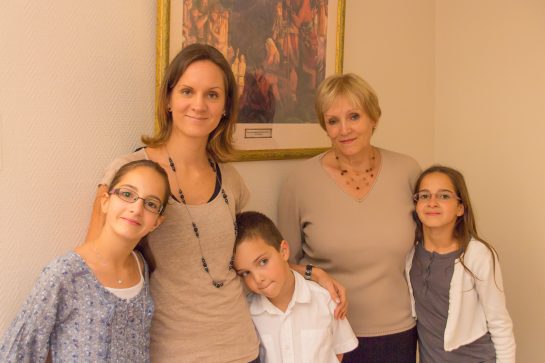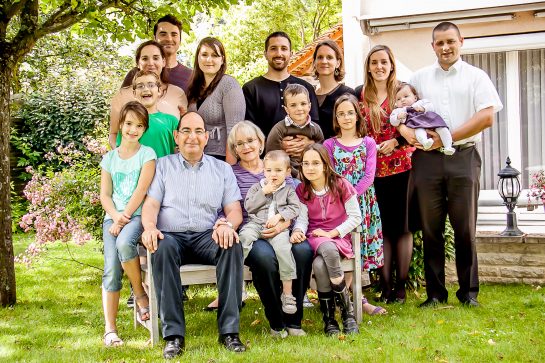Lire cette interview en français.
When Josiane Lazeras was thirteen, she was baptized and joined a small, close-knit group of pioneering Latter-day Saints near Paris, France. Even as the gospel helped her develop spiritually, Josiane found that the Church also encouraged her creativity and talents. And it made her consider the significance of becoming “a mother in Israel,” where love, spirituality, and action combine. Motherhood, she says—like the gospel of Christ—is a stimulant: “It pushes you to action. It’s something that permits you to go beyond your strength.”
What was your childhood like?
I am Parisian. I was born in a region near Paris and I’ve always lived in the Paris region. I love Paris. I love always going to Paris: going to the museums, walking in Paris, seeing the exhibits and the theater. I’ve traveled the world, but I am always happy to come back. I’m happy to come back to my home. I think it is a wonderful city and a beautiful region as well.
I learned about the Church in Paris. It’s a very funny story. The missionaries were going door to door and passed by my house. One of the two missionaries was called David Crockett. When my brother, who was fifteen at the time, saw David Crockett, an American, he instantly thought of cowboys and Indians. That night he said to us, “David Crockett is going to come to our house!” David Crockett did come, but he didn’t talk about Indians or cowboys. He talked about Joseph Smith, the First Vision, and The Book of Mormon. My brother was disappointed and he never converted or was baptized. My younger brother, who was eleven years old, and I (I was thirteen years old), were both touched by the message. We were both converted and baptized at that time. My mother was also baptized three years later.
My mother is very religious. When I was young, I saw her praying. I learned to pray. When the missionaries asked us to pray to know if the message of Joseph Smith and The Book of Mormon was true, for me and my brother, prayer was already something we were accustomed to. Even when we were young, we had the habit to get on our knees and pray. It is something wonderful that my mother passed to us, a spiritual heritage. I’ve done genealogy work for my mother’s Swiss side and I was astonished and happy to see that many of my ancestors were named Isaac, Abraham, Jacob, or Moses. There really has been a spiritual heritage that has enriched me, I think. Then, after my conversion, the Church has enriched me spiritually as well.
I was baptized in 1962. At that time, the Church in France was very small. There were only three branches in the entire Paris region: one in Paris, one in Versailles, and one in the southern part of Paris. That was all. Now, there are three stakes (since September 2013). Many people have the impression that the Church hasn’t progressed a lot in France, but when I look back I can see the progress! I grew up when we were very few in number. At school, no one knew about Mormons. My brother and I were the only Mormons there.

Was it difficult to be the only Mormons?
No, frankly, it wasn’t difficult. There were only a few of us, but we were a very close group and the missionaries helped us quite a bit in preaching the gospel and in our personal progression. We had to walk for miles to go to church because there wasn’t a bus. We were a little like pioneers, I believe. I think if we asked the pioneers of the Church if it was difficult to be a pioneer, they would say “no” because they were supported by the Spirit even if they had difficult moments and many who died. But they were together—they danced and sang together. For me, I never felt that it was hard. We were sure in our testimonies. We were doing well. And we were together. I wasn’t alone. We were a small group, but it wasn’t difficult.
In fact, being in the Church pushed us to accomplish things. For example, when the first chapel was built in the Paris region, it was at Versailles. It was necessary for us to contribute financially. We were adolescents and without income, but with the small group of members in our branch we created a show that we performed for every branch we could. We also asked the sisters to make cakes which we sold during the show. All of this was to earn money for the construction of the chapel. We did shows, and trips, and many things. I think it was the Church—the gospel—that pushed us to find ideas, to be inventive, to find things to do, in order to talk about the Church. I had a beautiful adolescence thanks to the Church because it encouraged us to do many things.
What were your dreams for the future when you were a child or adolescent?
My dream was to marry in the temple, have children, and raise my family in the gospel. It was a dream I accomplished, which is wonderful! I never had grand professional ambitions. I studied, I had goals, I worked, I tried to get to the best possible level of education, but I never had dreams of becoming the President of the Republic. For me, the most important thing is the family. Loving my husband, my children, my grandchildren, my parents, has been most important to me because I know that I will find them again after this life. My home will no longer exist, but my family will—I hope that my family will be there with me. I do everything for that goal. My dream is to have an eternal family. Since my adolescence that has been my dream.

Do you think that your conversion changed your dreams for your life?
I read a comic strip once that I really liked. There was a little boy who was looking at his mother’s wedding pictures with her. She showed him: “This is your grandpa, this is your grandma, this is me…”
The little boy asked, “And me, where am I in the pictures?”
“You didn’t exist yet”
“I didn’t exist? That’s not possible!”
When the missionaries taught us the plan of salvation and that we came from a pre-existence, for me that was obvious. For me, it wasn’t possible that we didn’t exist before this life. Even if I didn’t know the gospel, I would still have the feeling that there was a pre-existence. I said to myself, “Yes, this is natural. It couldn’t be any other way.”
Without doubt, the reason why I accepted the gospel so easily is because everything seemed natural to me. I don’t think my conversion changed my life at the time. If I was much older, perhaps, it would have changed it, but no, at the time it didn’t change my life or my dreams.
What was your experience becoming a wife and mother?
I met my husband, who is also Parisian, in the Church. We’ve raised our family by our religious principles.
The first time I had a baby, it was very difficult. I had been sick during my entire pregnancy and then my daughter was born a month early with many problems. We didn’t know much. Then doctor told us that it was certain that she would not survive. That was a shock. When I learned that this baby, my baby, a piece of myself was perhaps going to die, I cried a lot and prayed a lot. In my despair, I remember saying, “Heavenly Father, if you take this baby, take me with her.” I wanted to die with my baby because I did not want to leave her. It was very, very difficult.
Under the priesthood, she was blessed by my husband and father, and she survived. I realized afterward that I never said, “God does not exist,” or “God is evil.” For me, even in my grief, I knew that my Heavenly Father was there. I wanted to die so I didn’t have to be separated from my baby, but that experience greatly expanded my testimony. I could say to myself, “Even in the worst moments, I know that He is there.”
When I was fourteen years old, I received my patriarchal blessing. It said that I would see “the accomplishment of my vocation as a mother in Israel.” At fourteen years old, I said to myself, “What does that mean?” I wasn’t one who liked to babysit. Little children did not interest me. I didn’t have little brothers or sisters or cousins at the time. I said to myself, “What is this, a mother in Israel? I don’t want to live in Israel!” I didn’t understand what it meant. It was marked so each time I opened my patriarchal blessing during the years, I asked myself about it.
Yet, those blessings spoken of in my patriarchal blessing have been very present in my life; my role as a wife and mother has really been the most strong and the most important thing for me. If something happens to one of my children, it affects me a lot. Because of this, I am always ready to help if it’s necessary. I had the opportunity, when my daughters were young, to take care of one of my nieces for a month. I realized then that I had developed the same bond with this child as my own. If I had adopted a child, I think I would have had the same love for that child as my own. It’s possible, I think, to have a maternal bond without a biological bond. It depends on the person, of course. But for me, I really believe that I could.
There were two languages in your home?
I studied English and received a degree in translating and interpretation. When I got married, someone told me, “That’s good! You can teach English to your kids.” But I wasn’t able to, I think, because English isn’t my native language. When you have all your children around you, can you really speak in another language? Things would come spontaneously in French and so I never really spoke to them in English. But I always had a lot of books in English at our house. Now DVDs are in several languages, but when my children were small, there were only VHS videos—Disney videos. I always bought them in English. My children would complain when they watched the movies: “But why? We don’t understand them.” I would say, “You understand the images. You will have the sound of English in your ears.”
When my children were adolescents, I realized that they didn’t learn a lot in the language studies at their French middle school. So, when they were around fourteen years old, I sent my children to the United States for four months to live with an American family who didn’t speak French. It was hard for them at first, but when they came back they spoke English! I remember one of my daughters cried on the phone saying, “Mom, I don’t understand anything.” I told her, “Speak with your hands. That will work.”
Twenty years ago I realized that English was indispensable in the world and in the Church. I subscribed to the New Era because it was necessary that my children could also read English. I tried to give them lessons in English and I think they’re happy now that I did. It’s useful everywhere.

Do you feel you are a model for your daughters as they become mothers?
I hope so! I really hope so. It’s hard to say because they are all different. Each one has a different life. I try not to give them advice. When I had my first daughter, I was advised to always lay babies on their side. Then, when I had my second daughter, it changed to laying babies on their stomach. After I had my other daughters, it changed to laying them on their back. When my oldest daughter had her first baby she asked me for advice. I don’t know why. I said, “Listen, I don’t want to give you advice. I’ve experienced everything: laying babies on their back, on their stomach, on their side. It changes all the time! You decide with your pediatrician and with your husband. Decide together. I don’t have advice to give.”
That is a small example, but my daughters have independent lives. When they come to my house, it’s my house. But their house is their house. I don’t want to interfere—not in the sense that I don’t want to help—I do want to help, but it’s them who observes, who decides, and who acts.
I think each woman is different and each woman is going to raise her children differently. I am not sure if I raised my four children in the same way. I think there were differences between the first ones and the last ones. It’s important to love your children, but that comes naturally when you have children.
What is your definition of motherhood?
It’s not a sacrifice. It’s not a commitment. It’s a bond that is very, very strong. It’s difficult to define. It’s a bond, but it’s more than that. It pushes you to action. It’s something that pushes you to act and permits you to go beyond your strength. There are nights as a mother when you collapse on the bed and ask how you had the strength to go that far. Motherhood is a kind of stimulant that pushes you to act for the well-being of your children. I don’t really know, since it’s hard to define. It’s love. It’s not something material or physical. It’s an emotional bond that is a push to action. Motherhood is love. I will define it as that.
What do you think motherhood is for women who don’t have children?
My youngest daughter isn’t married yet. She is a teacher and works in an elementary school. She has always loved children a lot. She has had nieces and nephews since her adolescence. I believe she fills a maternal role for the children at her school. I think that we can have a role towards children that approaches motherhood without being married and having children. It may be difficult to not have your own children. But by helping other people’s children, we can love the children on the earth and in the Church as well.
Spirituality is part of a maternal role?
Yes, it is very important because having children on this earth is wonderful, but life on this earth doesn’t last long. If we don’t prepare for eternity, we won’t have much after. If we don’t work to develop the spirituality of our children in order to be sealed to them in the temple, we will not be sure of having them in the eternity. And life is short.
Spirituality for me is fundamental. The ordinances of the temple have such great importance—the sealing for me is essential. Otherwise, what will I have? I will only have a small amount of happiness and then afterward, an emptiness. Developing spiritually is the most important part. The most important.
At A Glance
Josiane Lazeras

Location: Paris, France
Age: 65
Marital status: Married since 1974
Children: Four daughters (38, 35, 32, 27)
Occupation: Retired translator, current missionary
Baptism: September 22, 1962
Schools Attended: Degree in translation and interpreting
Languages Spoken at Home: French
Favorite Hymn: “Divin Amour”
Interview by Ashley Brocious and Lauren Brocious. Photos used with permission.
At A Glance
